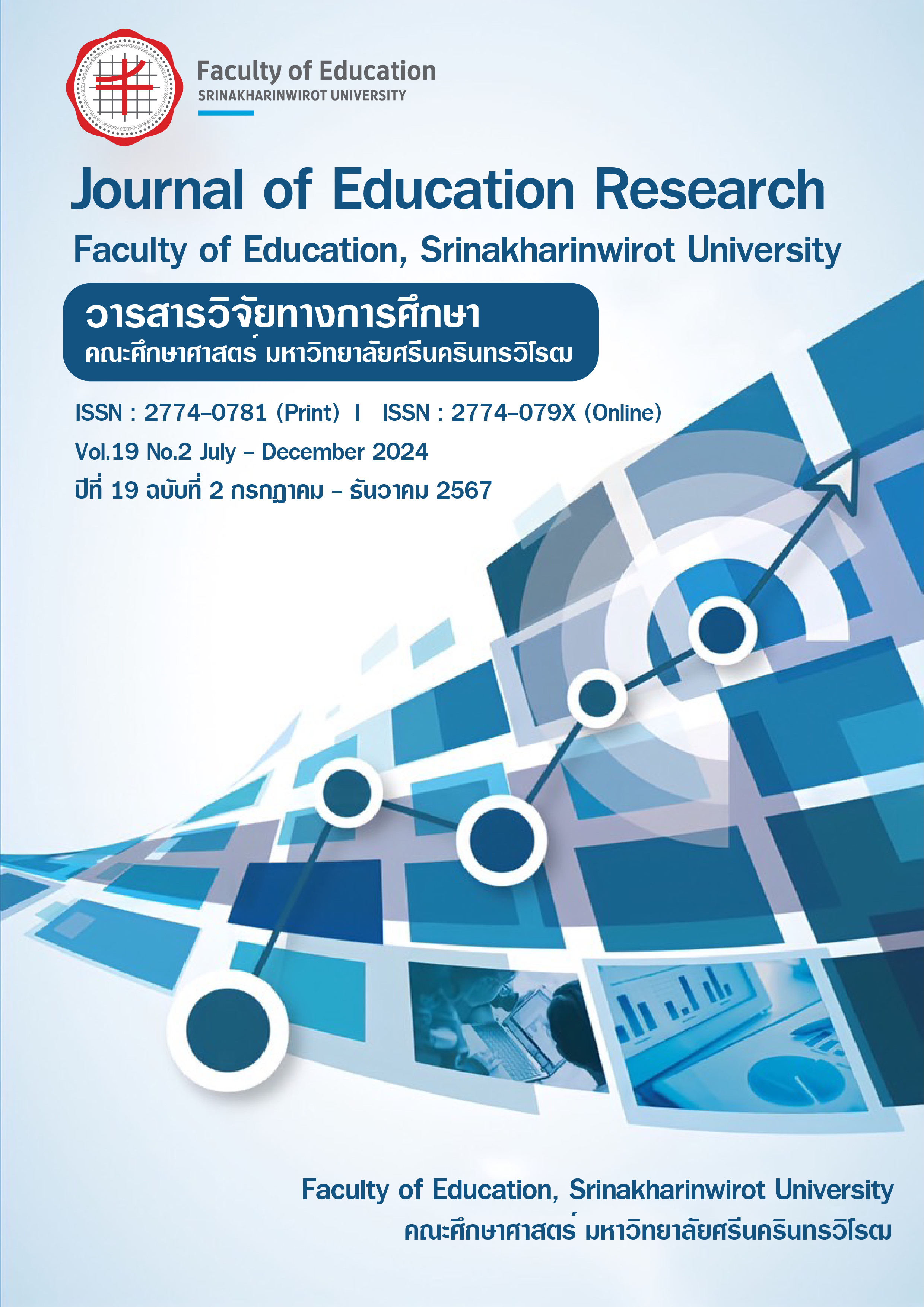THE ENHANCEMENT OF EMOTIONAL COMPETENCE AMONG EARLY CHILDHOOD THROUGH GROUP ACTIVITY BASED ON CREATIVE APPROACHES
Keywords:
Emotional competence, Early childhood, Group activity based on creative approachesAbstract
The objectives of this research are as follows: (1) to study the emotional competence of preschool children; and (2) to compare their emotional competence before and after participating in group activities based on creative approaches. The study involved 90 preschool children aged 3-5 years, from kindergarten levels 1-3, during the second semester of the 2023 academic year at a preschool development center. To assess emotional competence, data were collected from the entire population, and a sample group was selected for intervention through purposive sampling. Twelve children, who scored at or below the 50th percentile in emotional competence, and were willing to participate in the experiment, and had parental consent, were chosen. The research instruments included the following: (1) an emotional competence assessment form for preschool children with a reliability score of 0.992; and (2) group activities based on creative approaches had a validity score of 0.933. The creative techniques used encompassed storytelling, imaginative viewing and narration, creative group activities, drawing and coloring, sensory play, board games, and role-play ing. Data analysis involved calculating the mean, standard deviation, and performing a dependent t-test. The findings revealed the following: (1) preschool children had high overall and individual emotional competence scores; and (2) those who participated in the creative group activities showed improvement in emotional competence at 0.05.
References
Alzahrani, M., Alharbi, M., & Alodwani, A. (2019). The Effect of Social-Emotional Competence on Children Academic Achievement and Behavioral Development. International Education Studies, 12(12), 141. https://doi.org/10.5539/ies.v12n12p141
Bartroli, M., Angulo-Brunet, A., Bosque-Prous, M., Clotas, C., & Espelt, A. (2022). The Emotional Competence Assessment Questionnaire (ECAQ) for Children Aged from 3 to 5 Years: Validity and Reliability Evidence. Education Sciences, 12(7), 489. https://doi.org/10.3390/educsci12070489
Denham, S. A., Wyatt, T. M., Bassett, H. H., Echeverria, D., & Knox, S. S. (2009). Assessing social-emotional development in children from a longitudinal perspective. Journal of Epidemiology & Community Health, 63(Suppl 1), i37–i52. https://doi.org/10.1136/jech.2007.070797
Pahl, K. M., & Barrett, P. M. (2007). The Development of Social–Emotional Competence in Preschool-Aged Children: An Introduction to the Fun FRIENDS Program. Australian Journal of Guidance and Counselling, 17(1), 81–90. https://doi.org/10.1375/ajgc.17.1.81
Tobin, R. M., Sansosti, F. J., & McIntyre, L. L. (2007). Developing Emotional Competence in Preschoolers: A Review of Regulation Research and Recommendations for Practice. The California School Psychologist, 12(1), 107–120. https://doi.org/10.1007/BF03340935
เกริก ยุ้นพันธ์. (2543). 2. In การเล่านิทาน (Vol. 3). essay, กรุงเทพฯ: สุวีริยาสาส์น.
คมเพชร ฉัตรรศุภกุล. (2546). กิจกรรมกลุ่มในโรงเรียน. กรุงเทพฯ: แสงรุ้ง การพิมพ์.
นิตยา. (2546). การใช้กิจกรรมกลุ่มเพื่อพัฒนาพฤติกรรมกล้าแสดงออกของนักเรียน ชั้นประถมศึกษาปีที่ 3 โรงเรียน บ้านปงสนกุ จังหวัดลำปาง. ศึกษาศาสตรมหาบัณฑิต สาขาจิตวิทยาการศึกษาและการแนะแนว บัณฑิตวิทยาลัย มหาวิทยาลยั เชียงใหม่, 10.
เยาวพา. (2542). การศึกษาปฐมวัย. กรุงเทพฯ: เอบี กราฟฟิคส์ดีไซน์.
ศรีกัญภัสสร์, & หาคูณ . (2560). ความรู้เบื้องต้นทางการศึกษาปฐมวัย : 15 เรื่องที่ควรรู้ (Vol. 3). โรงพิมพ์มหาลัยราชภัฏมหาสารคาม.
ศรีเรือน. (2553). 199. In จิตวิทยาพัฒนาการชีวิตทุกช่วงวัย (Vol. 9). essay, กรุงเทพฯ: สำนักพิมพ์มหาวิทยาลัยธรรมศาสตร์.
สมนึก เหลืองอ่อน. (2549). การใช้กิจกรรมกลุ่มเพื่อส่งเสริมความสามารถในการสร้างสัมพันธภาพระหว่างบุคคล ที่มีความบกพร่องทางสติปัญญา ช่วงชั้นที่ 3. ปริญญานิพนธ์ กศ.ม.(การศึกษาพิเศษ). เชียงใหม่: บัณฑิตวิทยาลัย มหาวิทยาลัยเชียงใหม่., 9.
สิริมา ภิญโญอนันตพงษ์. (2553). การศึกษาปฐมวัย. กรุงเทพมหานคร: มหาวิทยาลัยราชภัฏสวนดุสิต
Downloads
Published
How to Cite
Issue
Section
License

This work is licensed under a Creative Commons Attribution-NonCommercial-NoDerivatives 4.0 International License.



